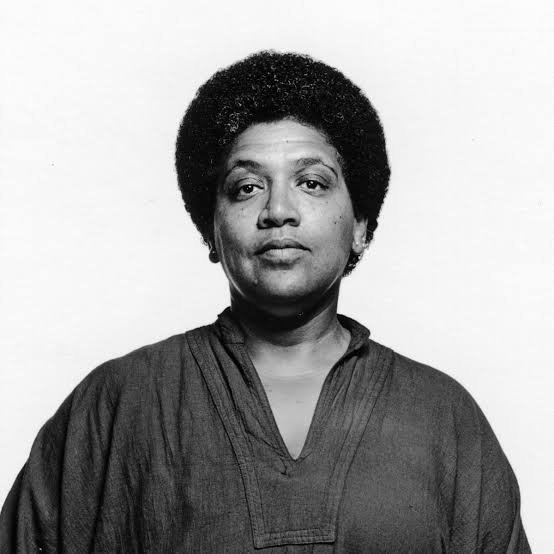International Women’s Day: Audre Lorde
“it is better to speak remembering we were never meant to survive”
- A Litany for Survival (1978)
Written by: Noémie Hueber
Born in New York City in 1934, Audre Lorde, born Audrey Geraldine Lorde, started to write poems between 12 and 13. She was a professor of English, a librarian, a writer, a poet, a mother and a lesbian.
Audre Lorde wrote and spoke all her life. She made herself loud to discuss the struggles and joys of black women, the challenges faced by lesbians and her love for literature. In 1979, she participated as a speaker at the National March on Washington for Lesbian and Gay Rights.
In 1980, after being diagnosed with breast cancer and going through mastectomy, she narrated her thoughts and feelings in The Cancer Journals, transforming her pain and fears into literary work. Her multi shaped work includes texts in verses such as the poetry collection named The Black Unicorn (1978) or prose, such as her biomythography Zami: a New Spelling of my Name (1980).
In 1962 Audre Lorde married Edwin Rollins, with whom she had two children before divorcing in 1970. This union is symbolic of her lifelong battle to assert herself as an independent lesbian and black woman.
First of all, Audre Lorde chose a white husband at a time when interracial marriages were rare and even illegal in certain states. In fact, it was only in 1967 that a Supreme Court decision made it fully legal in the United States after the couple Mildred and Richard Loving fought for years to be able to marry. Since then, the 12th of June is called, after the couple, “National Loving Day”. When marrying a white man, Audre Lorde then defied the implicit rules of endogamy, or, to put it in other words, she contested the custom of mating within the same cultural and social group.
Besides, Edwin Rollins was gay, Audre Lorde was a lesbian. Their union worked as a partnership, in which each of them had the freedom to live their own loving life. Throughout her life, Audre Lorde gradually involved herself in queer activism, even though she had lived her sexual life freely for years. In 1968, she met Dr. Frances Louise Clayton at Tougaloo College in Mississippi where she worked as a writer-in-residence. The two women spent nearly twenty years in a relationship, before Audre Lorde broke up and moved to the island of Saint Croix in 1981 with Gloria Ida Joseph, a Crucian-American activist and writer. Audre Lorde died on the island in 1992 of another form of cancer at the age of 58.
Audre Lorde and her 20 years partner Frances Clayton
Confronted with a lot of social and medical threats throughout her life, Audre Lorde had a specific relationship with the idea of survival. In an interview with the academic researcher Blanche Cook in 1982, she explained that speaking and acting are necessary for her community: “Survival is joy, mobility and effectiveness”. By living and doing what they feel is right, people create something that lives beyond themselves, something that will survive.
“[...] when we are loved we are afraid
love will vanish
when we are alone we are afraid
love will never return
and when we speak we are afraid
our words will not be heard
nor welcomed
but when we are silent
we are still afraid
So it is better to speak
remembering
we were never meant to survive.”
References
Pacifica Radio Archives (1982). Women and the world in the 1980s. Blanche Wiesen Cook and Audre Lorde. [Consulted online with the following link in March 2024]
Brandman. M, (2021). Audre Lorde. National Women’s History Museum. [Consulted online with the following link in March 2024]
Poetry Foundation. Audre Lorde. [Consulted online with the following link in March 2024]



